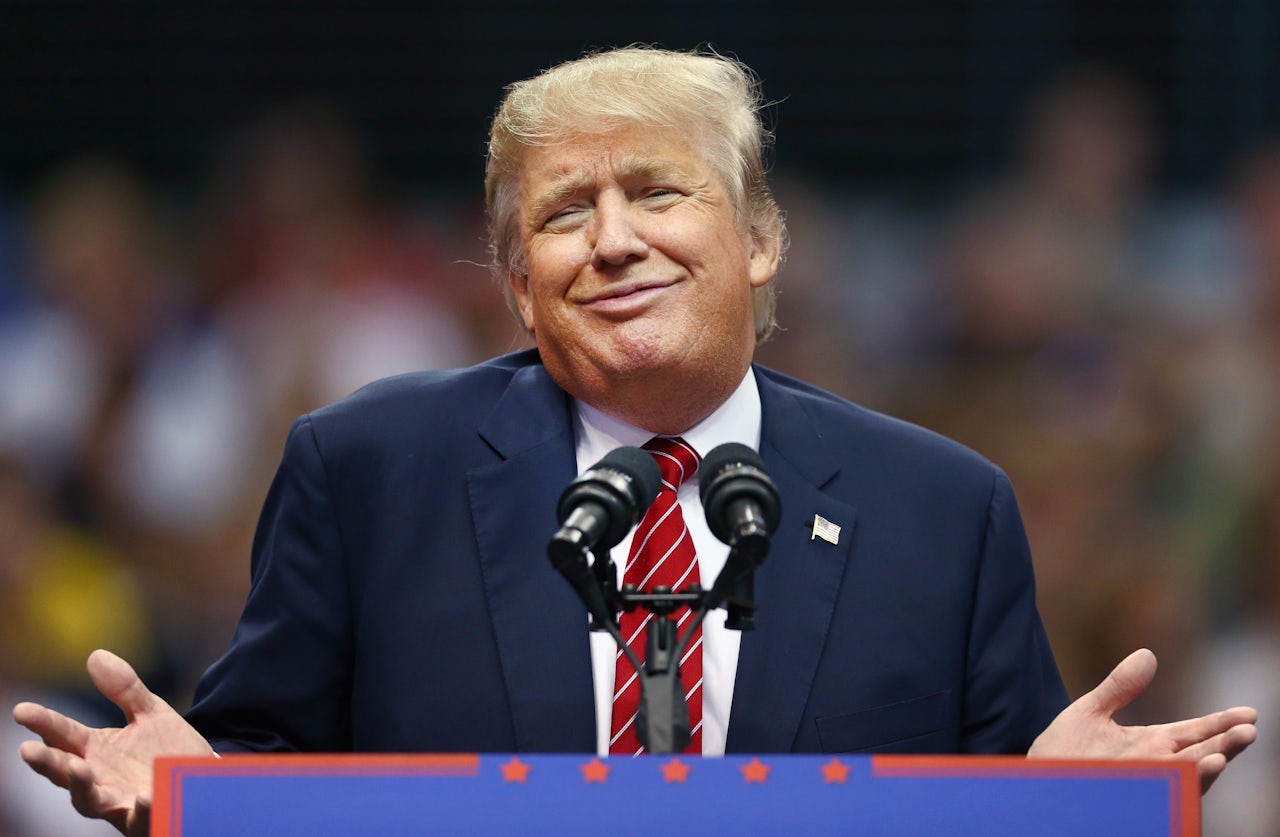One of Donald Trump’s go-to gags is to revisit an environmental debate from the 70s and 80s and insist that hairspray cannot possibly affect the ozone layer. “I said, ‘Wait a minute — so if I take hairspray and if I spray it in my apartment, which is all sealed, you’re telling me that affects the ozone layer?'” he said to a cheering crowd of 13,000 supporters in May 2016. “I say, no way, folks. No way!”
Trump was beating this drum even before the campaign, according to FactCheck.org. In 2011, he suggested that “eight-inch concrete floors” and “eight-inch concrete walls” in Trump Tower would stop hair spray from “destroying the ozone that’s 400 miles up in the air.”
This is a denial of seventh grade-level chemistry as well as Nobel Prize-winning science. It is in the nature of gas to flow between indoors and out — how does Trump think oxygen gets inside his apartment? — and dissipate throughout the atmosphere. In 1995, Paul Crutzen, Mario Molina, and Sherwood Rowland won the Nobel Prize for demonstrating how ozone forms and decomposes in the atmosphere, science they had been working on for over two decades. They found that chlorofluorocarbons used in spray bottles were gradually transported to the ozone layer, where UV light caused them to separate into parts including chlorine atoms, which decompose ozone.
It’s not surprising. Trump has demonstrated a weak grasp on even basic facts of science and a firm disinterest in learning more. For years, any significant snowfall seemed to prompt him to tweet about global warming being a hoax, despite the fact that short-term weather and long-term climate are not the same and the Earth is indeed warming on average. He has said that “environmentally friendly” light bulbs can cause cancer and that wind farms are bad for people’s health — both wild claims not backed by evidence. He’s pushed the harmful lie that vaccines cause autism. Last week Trump phoned the mayor of Tangier, a small Chesapeake Bay island where he received 87 percent of the vote, to deny that climate change is the reason the island is shrinking (it undeniably is).
Science, outside expertise, and dense information in general also seem to go against “the way Trump’s psychology operates,” said George Marshall, co-founder of a UK-based non-profit called Climate Outreach. The president notoriously doesn’t have the attention span for books or long intelligence briefings, and the majority of top science positions in his White House remain conspicuously vacant, including that of the presidential science adviser, a key figure who normally helps the president make policy decisions based on current science.
Science was glaringly missing from Trump’s Rose Garden speech announcing the United States’s withdrawal from the Paris Climate Accord, in which he talked mostly about global economics, calling the agreement a “massive redistribution of United States wealth to other countries.”
This is a denial of seventh grade-level chemistry as well as Nobel Prize-winning science
Trump doesn’t understand science, and he doesn’t care. He believes the path to success is to follow his gut. And his gut does not understand how particles in hairspray could escape his apartment, let alone how the Earth could be warming when it’s snowing in Manhattan. This science denial is a byproduct of his egomania, but it happens to fit in snugly with the rest of his agenda — especially when it comes to climate change.
Trump vowed to make “America First” the “major and overriding theme” of his administration. As part of that, he frequently blasts international treaties, portraying them as lopsided pacts that benefit other countries at the expense of the United States. Since taking office, he has sought to cut more than $1 billion from U.N. funding, launched a renegotiation of NAFTA, and claimed that NATO allies have not spent their fair share on defense.
In this context, leaving the Paris Accord was consistent branding. It’s “very unfair,” he said in the Rose Garden. “This agreement is less about the climate and more about other countries gaining a financial advantage over the United States.”
The problem is, Trump seems to misunderstand the basis of the accord in his griping about the “onerous energy restrictions” that it places on the United States, said Joshua Busby, an associate professor of public affairs at the University of Texas at Austin. In fact, the agreement doesn’t require any specific emissions reductions from participants. Rather than leaving it altogether, Trump could have pushed to change the U.S.’s voluntary emission target.
But that may not have mattered if withdrawing from the agreement was part of broader dogma. Trump has this larger “black helicopters argument that any sort of international treaty is giving up sovereignty and therefore un-American,” said Geoffrey Dabelko, a professor of environmental studies at Ohio University. Whether it’s trade, defense, global peacekeeping, or the environment, there seems to be “an across-the-board strategy to disengage and go it alone.”
Trump also claimed that the Paris Agreement would slash coal production. In reality, blaming the Paris Accord is a red herring — coal mining jobs have been vanishing for decades, threatened first by mechanization and now by market economics and the low price of natural gas. “Those jobs aren’t coming back,” Busby said, adding that hoping so amounts to nostalgia economics.
Nationwide, the coal industry is responsible for only about 160,000 jobs, just 65,000 of those in mining. For comparison, Starbucks alone employs about 157,000 people in the U.S. But that kind of “empirical story” isn’t as compelling as one that appeals to identity, Dabelko said. People want to blame environmentalism and climate change concerns for taking away their jobs. And Trump’s theatrics about coal strike a chord with workers in all the declining industries he’s courted, such as steel and other manufacturing jobs.
Science, outside expertise, and dense information in general also seem to go against “the way Trump’s psychology operates”
Withdrawing from the Paris Agreement means Trump fulfilled his campaign promise to do so, and keeps these voters in his corner, even as he fails to take action in other meaningful ways, Busby believes. “You’d think his concern for coal miners would translate into policies that actually help them,” he said, such as expanding Medicaid and dealing with the opioid crisis, which has hit hard in coal mining states such as West Virginia.
“Instead, you have a policy that’s justified in their name, to continue to rally their support,” he said. “If you make symbolic overtures of rhetoric, they maybe won’t notice their situation isn’t better.”
When it’s said that Trump exited the Paris Accord for his base, people often “picture the coal miners he puts behind him as props,” Dabelko said. But the part of Trump’s base that will actually benefit from the withdrawal? A small number of people who own coal mines and energy companies that haven’t transitioned away from fossil fuels yet.
Finally, undoing climate change action allows Trump to undo the legacy of Obama, who Trump has said “will go down as the worst president in history.”
By now we know that when Trump professes belief in something, it’s not always the case that he actually believes it. Whether on Syria, abortion, firing James Comey, or countless other topics, he’s constantly contradicting himself. So what actually underlies his decision-making?
Elizabeth Chalecki, an assistant professor of political science at the University of Nebraska Omaha, believes cognitive dissonance is at play. Trump signed a letter in 2009 with other business leaders urging Obama to take action on climate change and recently tried to build a sea wall to protect one one of his golf courses from global warming. This inconsistency belies a personal agnosticism on the issue, she said. “I don’t think he cares one way or the other,” she said, adding that if Trump had run as a Democrat — as he identified throughout the 2000s — he might talk about climate change very differently.
Trump has his own empiricism
But even if Trump did understand how climate change will cause droughts, floods, heat waves, agricultural disruption, and other public health emergencies, “his base doesn’t want him to,” said Chalecki. “He cannot hold both of those at the same time, so he has to let one go.”
“He is driven by the stuff that moves him: by the here and now, the people around him, status, and personal power,” Marshall said. “He wants to be loved, the way coal communities love him. That’s how his narcissism works.”
In a sense, Trump has his own empiricism, Marshall said. He has done things his way for 71 years, and it has worked for things like building a business empire and winning the U.S. presidency.
As a result, he has an invulnerability complex, in which he ultimately makes decisions based on a “Trump-ish algorithm” of what feels right to him, regardless of whether or not it’s internally contradictory, Marshall said.
“His science is a personal lifelong experiment in which he does things that are outrageous and audacious and it works,” Marshall said. “He’s sold now on his provocative character, and pulling out of Paris is exactly the kind of provocative action he likes.”
Correction: An earlier version of this story misattributed quotes from Elizabeth Chalecki to Elizabeth Suhay, and included one misspelled version of Geoffrey Dabelko’s name.

